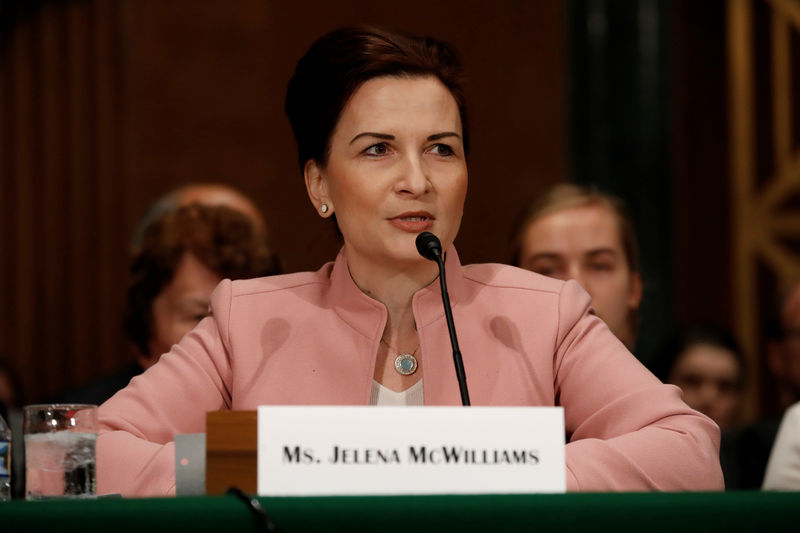 © Reuters. Jelena McWilliams, nominee to be chairperson of the Federal Deposit Insurance Corporation, speaks during a Senate Banking Committee hearing on Capitol Hill in Washington
© Reuters. Jelena McWilliams, nominee to be chairperson of the Federal Deposit Insurance Corporation, speaks during a Senate Banking Committee hearing on Capitol Hill in WashingtonBy Pete Schroeder
NEW YORK (Reuters) – A leading U.S. bank regulator said on Wednesday the government is considering easing requirements around the “living wills” large banks must submit detailing how they could be safely dissolved in a crisis.
The Federal Deposit Insurance Corporation (FDIC) and Federal Reserve will propose changes in the coming months to rules dictating those plans, according to FDIC Chairwoman Jelena McWilliams.
The proposals will focus on simplifying and easing requirements around the plans, as banks have complained the lengthy documents can be onerous to produce.
“Resolution plans have been a valuable tool,” McWilliams said at a banking conference. “At the same time, the process has imposed meaningful cost and burden on the firms and, frankly, the agencies.”
The resolution plans, commonly known as living wills, require large banks to detail how they could be unwound in bankruptcy without disrupting the broader financial system. If regulators do not find a plan credible, they could impose restrictions on a bank’s activities or even order it to divest.
McWilliams did not say what specific changes could be made to the plans, which were mandated as part of the 2010 Dodd-Frank financial reform law.
But she noted that the goal is to make the plans more targeted for global banks, recognize the reduced risk posed to the financial system by regional firms, and increase transparency around the plan submission and review process.
McWilliams also said regulators were considering “refinements” to Orderly Liquidation Authority, another post-crisis tool that allows regulators to temporarily use taxpayer funds to facilitate an orderly dissolution of a failing bank. In February, the Treasury Department recommended the tool be preserved, but only for use in emergencies.
She also supported efforts by Congress to revise the bankruptcy code to better accommodate a failing complex financial institution, saying it should be the first option for any failing bank. Several bills to augment the bankruptcy code specifically for banks have been considered by Congress but none have become law.
“The greatest untested resolution challenge comes from the largest, most complex institutions,” she said. “The bankruptcy code was not written with large, complex financial institutions in mind…The FDIC stands ready to work with Congress and hopes to see such a measure signed into law.”
Fusion Media or anyone involved with Fusion Media will not accept any liability for loss or damage as a result of reliance on the information including data, quotes, charts and buy/sell signals contained within this website. Please be fully informed regarding the risks and costs associated with trading the financial markets, it is one of the riskiest investment forms possible.
Source: Investing.com





























